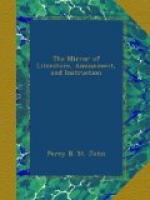Few animals have been the cause, perhaps, of so many superstitions as the common domestic Cat; most of them are too well known here to require repetition, but the still prevalent, popular prejudice that this creature sucks the breath of sleepers, especially children, and thereby kills them, has been signally refuted by modern naturalists, who observe, that even if it were capable of drawing a person’s breath thus, the construction of its mouth renders it impossible to impede the respiration of the slumberer through mouth and nostrils at the same time; this vulgar superstition probably arose from cats liking to lie warm, and nestling consequently in beds, cribs, and cradles. To dream of cats is considered unlucky, denoting treachery and quarrels on the part of friends. Cats, from no apparent cause, seeming shy, agitated, and traversing the house uttering cries, as if alarmed, is believed to forbode sudden and causeless strife between the members of the families with whom they reside. That the breath of these animals is poisonous, that they can play with serpents and remain uninjured, whilst their fur communicates the infection of the venom of those reptiles, that they lend themselves readily to infernal agents and purposes, that certain portions of their bodies possess magical properties and were efficacious in the preparation of charmed potions, and that they are partly supernatural creatures, endowed with a power of bringing good or evil fortune upon their possessors, with other facts just as credible, was once devoutly believed by the illiterate, as it is partially at this very day.[1]
Dogs are generally supposed to possess the faculty of beholding spirits when they are invisible to mortals, and of foretelling death by lamentable howls. It is lucky to be followed by a strange dog. The Welch believe in the apparition of certain spirits under the form of hunting dogs, which they call dogs of the sky (cwn wybir, or cwn aunwy:) they indicate the death of a relation or friend of the person to whom they appear, but though generally accompanied by fire, are innocuous. The tradition of the Spectre Hound of Peel Castle (Isle of Man) or Manthe Doog, is well known. The religious superstition of Mahommedans lead them to consider the dog as an unclean animal; but the dog of the Seven Sleepers, according to a tale in the Koran, is, say the faithful, the only animal admitted into heaven. A more sweet and soothing creed is held by “the untutored Indian,” who believes that the faithful companion of his laborious mortal career will accompany him into the everlasting regions; and, indeed, the idea that animals possess actually an inferior soul, and that, maltreated as they are on earth, they too have their appropriate heaven, has by many been considered a speculation less superstitious than truly philosophical.




